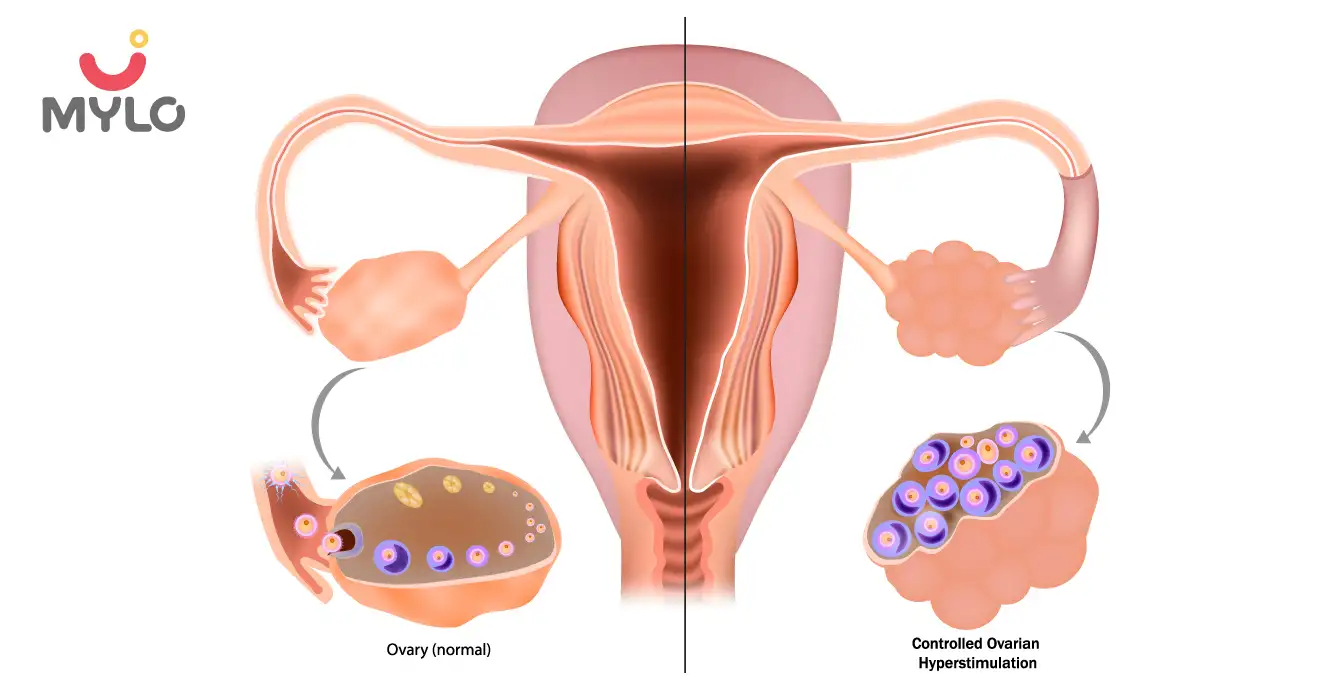- Home

- What are the Signs of Implantation Bleeding & When to Take a Pregnancy Test?
In this Article
Hormones
What are the Signs of Implantation Bleeding & When to Take a Pregnancy Test?
Updated on 21 July 2023



Medically Reviewed by
Kusum Sabharwal
Obstetrician & Gynecologist - MBBS| DGO
View Profile

When you are trying to get pregnant, you will be hyper-aware of every sign, every ache and craving in your body, wondering whether it’s a sign of pregnancy. One of the most common signs of pregnancy is bleeding. In case you have some light spotting, does it denote anything?
While in the first instance it can be hard to tell, during normal pregnancy what you may see is called implantation bleeding.
What is Implantation bleeding?
It is the light bleeding or spotting which occurs between 7 to 14 days after fertilization. After ovulation and the moment, the egg is fertilized by the sperm, the embryo starts growing. During this period, the inner lining of the uterus starts to change in order to nourish and protect the embryo.
Within 5 to 6 days after fertilization, the growing embryo moves down the fallopian into the uterus. Implantation bleeding starts when the embryo makes its way to the uterus, causing the blood vessels to burst.
You may also like : How to Differentiate Between Implantation Bleeding and Your Periods?
Signs of Implantation Bleeding
Though it isn’t easy to tell the difference between implantation bleeding and menstrual bleeding, here are some of the signs you need to observe:
1. Colour of discharge
The colour of implantation bleeding is likely to be pink-brown in colour. On the other hand, menstrual bleeding can turn crimson red.
2. Cramping
Cramping due to period is usually more intense and lasts longer. While cramps during implantation is usually short-lived and less intense
3. Clotting
Implantation bleeding does not produce a mix of blood and tissue as compared to menstrual bleeding.
4. Duration
Implantation bleeding lasts between 1 to 3 days as compared to your periods which can last between 4 to 7 days.
Symptoms of Pregnancy
In case of pregnancy, you are likely to experience the following:
1. Nausea
Some women experience morning sickness in extreme at any time of the day whereas some never experience it. Changes in the hormonal levels make the pregnant woman feel nauseated and it is one of the common early signs as well.
2. Breast tenderness and changes
A lot of hormonal changes happen after conception. The breasts may become sore, and swollen and have visible veins, and are tender to touch. The dark area around the nipples (areola) may also darken.
3. Headaches
Many pregnant women complain about frequent mild headaches which happen due to the increased blood volume and hormones. Hypertension and high blood pressure levels also result in severe headaches during the beginning of pregnancy.
4. Frequent Urination
The human body produces a hormone called HCG (Human Chorionic Gonadotropin) in the first few weeks of pregnancy which increases the blood flow to the pelvic region. That makes your kidneys work hard and puts pressure on your bladder which makes your loo trips endless.
5. Fatigue
The rise in your progesterone levels makes you feel sleepy day and night. A lot is happening inside your body which makes you feel tired and exhausted.
Such symptoms are the result of hormonal changes occurring in your body to support pregnancy. However, you can experience such symptoms during a period as well.
Taking a pregnancy test
Since it's not easy to tell the difference between menstrual and implantation bleeding, you should take up a pregnancy test to check if you could be pregnant. They measure the level of HCG hormone in your blood.
A urine pregnancy test is 99 per cent accurate. In case you have a negative result, but you feel the symptoms are persistent, wait for 7 days and retest.
References:
1. Hasan R, Baird DD, Herring AH, Olshan AF, Jonsson Funk ML, Hartmann KE. (2010). Patterns and predictors of vaginal bleeding in the first trimester of pregnancy. NCBI
2. E.W. Harville, A.J. Wilcox, D.D. Baird, C.R. Weinberg. (2003). Vaginal bleeding in very early pregnancy. OXFORD Academic





Medically Reviewed by
Kusum Sabharwal
Obstetrician & Gynecologist - MBBS| DGO
View Profile


Written by
Parul Sachdeva
A globetrotter and a blogger by passion, Parul loves writing content. She has done M.Phil. in Journalism and Mass Communication and worked for more than 25 clients across Globe with a 100% job success rate. She has been associated with websites pertaining to parenting, travel, food, health & fitness and has also created SEO rich content for a variety of topics.
Read MoreGet baby's diet chart, and growth tips

Related Articles
How to Differentiate Between Implantation Bleeding and Your Periods?
What is Ectopic Pregnancy - Symptoms, Causes, Treatment, Prevention & How to Detect it?
Signs and Symptoms of Pregnancy & Implantation Bleeding that Every Woman Should Be Aware of
Bleeding During Pregnancy? What Does It Mean & Should You Consult A Doctor?
RECENTLY PUBLISHED ARTICLES
our most recent articles

In Vitro Fertilization (IVF)
Ovarian Stimulation: Understanding the Process and What to Expect

In Vitro Fertilization (IVF)
IVF Baby Delivery: Will You Have a C Section or Vaginal Delivery?

In Vitro Fertilization (IVF)
How Many Injections for IVF Treatment Do You Really Need

Conception
IUI Failure Symptoms & Reasons: Understanding Why IUI Fails & What to Do Next

Breastfeeding & Lactation
Fever During Breastfeeding: Tips from Experts for New Moms

Diet & Nutrition for Mothers
Indian Food to Increase Breast Milk: Everything You Need to Know
- Lactose Intolerance in Babies: A Parent’s Guide to Identifying and Managing it
- TESA IVF: How This Procedure Can Help You Achieve Your Dream of Parenthood
- How Can You Encourage Sensory Play for Your Baby and What are Its Benefits?
- After How Many Weeks IVF Pregnancy Is Safe: Understanding The Ideal Timeline
- Exploring the Senses: 9 Incredible Benefits of Sensory Play for Your Child's Development
- The Ultimate Guide to Childproofing Your Home
- Start Their Love for Reading Early: The Best Books for Baby's First Library
- CMPA (Cow's Milk Protein Allergy): Identifying Symptoms and Understanding Treatment
- Birth Control Options While Breastfeeding: Balancing Parenthood and Contraception
- How to Tell if Baby Is Still Hungry After Breastfeeding
- Baby Biting While Feeding: Expert Tips and Strategies for Prevention and Management
- Period During Breastfeeding What Every New Mother Should Know
- Exclusive Breastfeeding: Unlocking the Benefits of You and Your Baby
- Role of Stories and Rhymes in Your Baby’s Brain Development


AWARDS AND RECOGNITION
Mylo wins Forbes D2C Disruptor award
Mylo wins The Economic Times Promising Brands 2022
AS SEEN IN
















At Mylo, we help young parents raise happy and healthy families with our innovative new-age solutions:
- Mylo Care: Effective and science-backed personal care and wellness solutions for a joyful you.
- Mylo Baby: Science-backed, gentle and effective personal care & hygiene range for your little one.
- Mylo Community: Trusted and empathetic community of 10mn+ parents and experts.
Product Categories
baby carrier | baby soap | baby wipes | stretch marks cream | baby cream | baby shampoo | baby massage oil | baby hair oil | stretch marks oil | baby body wash | baby powder | baby lotion | diaper rash cream | newborn diapers | teether | baby kajal | baby diapers | cloth diapers |







